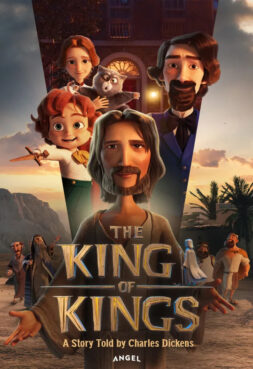
(RNS) — A new animated film detailing the life of Christ hit theaters just in time for Easter. Based on Charles Dickens’ “The Life of Our Lord,” “The King of Kings” offers a digestible vision of Jesus’ life, death and resurrection that’s especially suitable for children.
I went to see the movie — which earned a record-breaking $19 million in its opening weekend at the box office — with my family, thinking it would be relatively uncontroversial. But “the greatest story ever told” has plenty of controversial moments, no matter the medium.
From first-time director Seong-ho “Jay” Jang, the film features Oscar Isaac as the voice of Jesus. From its cast of well-known stars — Uma Thurman, Mark Hamill, Pierce Brosnan, Forest Whitaker and Ben Kingsley all voice key characters — it’s clear the movie intends to make a splash beyond the typical Christian audience.
Perhaps the best innovation in the film is the inclusion of the Dickens family in the telling of Jesus’ life. Charles Dickens serves as our narrator, and he convinces his rambunctious youngest son, Walter, that the Gospel narrative is what his beloved King Arthur tales are based on. The result is a story in which Walter and his cat imagine themselves as part of the story. This is particularly well done in the scene where Jesus calls his disciples to become “fishers of men,” as Willa the cat is just as excited as the fishermen by their large catch of fish.

“The King of Kings” film poster. (Image courtesy Angel Studios)
Overall, though, it’s largely a pretty dry, gentle portrayal of Jesus that’s basically a high-budget version of the sort of movies I watched during Sunday school in a Southern Baptist church growing up. But that doesn’t prevent it from stepping right into millennia-old controversies.
Specifically, is it even possible to simply retell the Gospel narrative as it is written and have it not be antisemitic? Seeing this on screen hammers the point home — the Pharisees are depicted as one-dimensionally evil. They are some of the only people throughout the film who are recognizably Jewish, as shown through their clothing.
The movie hews very closely to the traditional Christian perspective that it was the Jews and not the Roman Empire that bear primary responsibility for Jesus’ death — a claim scholars have often argued is flawed and has been officially denounced by the Roman Catholic Church. In some ways, this is a problem with the source material that churches and clergy will have to contend with as the faithful gather to hear the story of Jesus’ passion.
As a pastor, I always edit out John’s condemnation of “the Jews” that appears in the lectionary around Easter time and generally don’t read that Gospel account of Jesus’ death at all because those passages have been used to foment antisemitic violence.
The fact is, we have choices on how we present this story, and we are responsible for how we portray Jesus’ death.
Beginning in 1927, a film of the same name as this one and continuing to Mel Gibson’s “The Passion of the Christ” in 2004, films about Jesus’ life have faced allegations of antisemitism, failing to reckon significantly with the power and responsibilities they have as storytelling mediums. Sometimes, they have even been lauded by official church authorities in their editorial decisions.
Other theological controversies in films about Jesus are more minor. Did the Holy Spirit descend upon Jesus for his baptism as a dove or like a dove? How did the loaves and fishes multiply — was it magic or sharing? They are still likely to cause some conversation among the types of people likely to see this film.
And some have wondered whether we really need another retelling of Jesus’ life. But Angel Studios, the producer of the film, has tapped into an important market. While the movie has only a 66% positive rating on Rotten Tomatoes, the “verified” audience reviews at the time of writing are 97% positive. Committed Christians looking for religious content during Holy Week are undoubtedly a big part of the film’s box office success, as the studio hopes to follow the success of its Christian thriller, “Sound of Freedom,” and the hit television series, “The Chosen,” which also depicts Jesus’ life.
It also helps that Angel Studios uses a crowdfunding model, where fans can become members and help select projects that they find worthy of their consideration. They have also made it a practice to release media for free, asking those who enjoyed it to support the project with a donation. That model was on full display at the end of “The King of Kings,” when a bevy of live-action children came onscreen at the end of the film with a “special message” inviting viewers to donate if they liked the movie. To make matters more peculiar, all the children featured were white.
I would be lying to say this donation request didn’t diminish the previous hour’s depiction of Jesus as incensed at religious leaders who charge exorbitant fees; the standard donation is set at $75 if you scan the QR code. And, I was particularly surprised at the missed opportunity to depict the message of Jesus as appealing to a diverse group of people.
Regardless of the missteps, “The King of Kings” certainly showcases the enduring power of Jesus’ story, one that has never been without controversy. It has always required navigating difficult situations and a proper consideration of the responsibility of the storyteller. That is the task the movie fails to accomplish.
The real question is whether faith-based audiences will care about this failure at all. Either way, we can expect to continue to see more retellings of Jesus’ life in animation and in real-life, not necessarily because it’s the greatest story ever told, but because there is a lot of money to be made in it.
(The Rev. Michael Woolf is senior minister of Lake Street Church of Evanston, Illinois, and the author of “Sanctuary and Subjectivity: Thinking Theologically About Whiteness and Sanctuary Movements.” The views expressed in this commentary do not necessarily reflect those of Religion News Service.)
